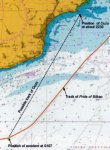RichardS
N/A
I am happy for you to prove me wrong but I do not believe "right of way " appears in the UK Highway Code. The "slight" difference is that "stand on" imposes obligations whereas "right of way" implies rights.
Right of way vehicle, priority vehicle, stand-on vehicle ..... it doesn't matter which term you prefer, the difference is minimal. In each case you must avoid a collision if you possibly can even if you start off as the priority/right of way/stand on vehicle.
I believe that the first appearance of the phrase "right of way" is in the introduction.
Richard

